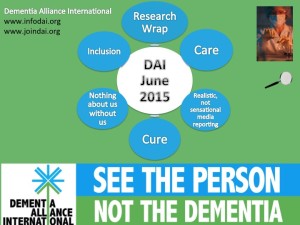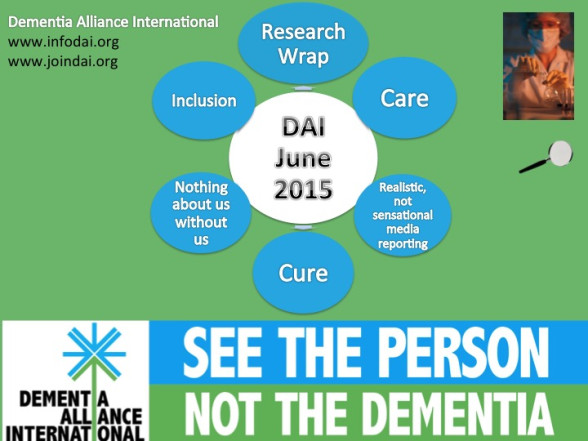 This weekly blog is late, due to time constraints caused by travels of the editor, and various other issues taking precedence which I will write about very soon. Please accept our (my) apologies.
This weekly blog is late, due to time constraints caused by travels of the editor, and various other issues taking precedence which I will write about very soon. Please accept our (my) apologies.
However, there are a couple of interesting research reports I felt would be of interest to members this week, and a recently released ADI newsletter, the first one that DAI has a full page in as a regular feature.
Global Perspective Newsletter June 2015
Firstly, the Alzheimer's Disease International Global Perspective Newsletter is out, with the first full page insert of news by Dementia Alliance International.
You can download the full newsletter here: ADI Global Perspective Newsletter June 2015. DAI is featured on page 7.
Younger Onset Alzheimer’s disease
Reported on 28 May 2015 by Dr Ian McDonald in Dementia News, currently the Science Communicator at Alzheimer's Australia, is another interesting research report: Younger Onset Alzheimer’s disease – new research reiterates it is not just about memory loss.
It is common to associate a diagnosis of Alzheimer’s disease with memory loss and while this is the case for many, new research has suggested that younger people (i.e. less than 65) with a diagnosis of Alzheimer’s disease will more commonly have problems associated with judgement, language and/or visual and spatial awareness, rather than memory loss.
This result was published in the Journal Alzheimer’s and Dementia and suggests a need for a greater awareness of the different symptoms associated with Alzheimer’s disease. This is something that Alzheimer’s Australia and other dementia advocacy groups around the world are committed to doing.
The study, which was undertaken in the UK and led by researchers from the University College London, analysed data from 7815 people in the US National Alzheimer Coordinating Centre database. Each participant had a diagnosis of Alzheimer's disease, and a record had been made of the symptoms they had first noticed in the early stages of the disease. The average age of the group was 75, with the youngest person aged 36 and the oldest aged 110.
The results found that younger people with a diagnosis of Alzheimer’s disease more commonly displayed non-memory cognitive impairments (i.e. judgement, language, etc.), however the results also showed that the odds of depression and behavioural symptoms also increased with younger age. In comparison the odds of having psychosis (confused thinking) but no behavioural symptoms increased with older age.
Source: Alzheimer's Australia Dementia News
ADI Report: Women and Dementia
ADI have also published an important report, Women and Dementia, with the purpose of this report is to understand the main issues affecting women in relation to dementia from an international perspective. The report examines the effect of gender on three specific groups: women living with dementia; women caring for people with dementia in a professional caring role; women undertaking an informal caregiving role for someone with dementia.
Key findings
Across all regions of the world, dementia disproportionately affects women.
More women live with dementia than men. The prevalence is higher for women than for men; women are more at risk of developing dementia and the symptoms they live with are more severe.
Women provide a substantial proportion of informal care to people with dementia, with around two thirds of primary caregivers overall being women.
This figure is significantly higher in LMICs, areas which will account for 71% of the global prevalence of dementia by 2050.
The formal care workforce is predominantly female, providing the majority of health and social care in the community as well as in hospitals and care homes.
There is currently very little research focusing on the gender issues of living with, or caring for, someone with dementia and on the long-term impact of dementia on women as family and formal caregivers.
The report recommends that:
All countries need to understand the current and predicted prevalence and acknowledge that dementia disproportionately affects women. Accordingly, policy makers should review what support is currently available and what is required to meet future needs.
There is also a need for skilled care competencies for health and care staff and professionals working with people living with dementia with complex needs and co-morbidities.
In all regions people should be able to access appropriate information and support in place, enabling women across the world to continue to provide care, and to feel cared for themselves.
Source: Alzheimer's Disease International
